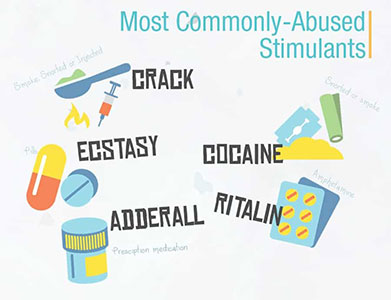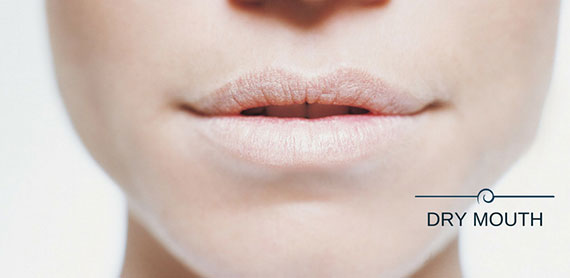Stimulants, also called psychostimulants, are psychoactive drugs that induce temporary improvements in mental or physical functions.
Stimulants have broad use as pharmaceutical and performance-enhancing or recreational/illicit drugs. Stimulant examples are methamphetamine, methylenedioxymethamphetamine (Ecstasy), levoamphetamine/dextroamphetamine (Adderall®), and methylphenidate (Ritalin®). They have been used to help depression, attention deficit disorder, and narcolepsy and to encourage weight loss. In America, the annual prevalence is 1.4% for “stimulants”.

Stimulants share the following oral manifestations:
- Xerostomia – dry mouth.
- Hyposmia – a decreased sense of smell.
- Sinusitis – inflammation of the sinus cavity.
- Dysgeusia – distortion in the sense of taste.
- Sialadenitis – salivary gland infection.
- Stomatitis – inflammation of the mouth lining.
- Gingivitis
- Glossitis – inflammation of the tongue.
- Discolored tongue
- Bruxism – teeth grinding.
- Dysphagia- difficulty swallowing.

Methamphetamine abusers display bruxism, undue tooth wear, dry mouth, and rampant cavities. Patients may describe their teeth as falling apart. There is a different cavity pattern on the front part of teeth surfaces. In addition, there is an increased incidence of decay between the front teeth. Rampant cavities, decreased oral hygiene, and teeth grinding are common findings. In addition, a considerable decline of salivary buffering ability in methamphetamine abusers may activate the risk for dental erosions. Methamphetamine abusers should be mindful of this manifestation.

Methylenedioxymethamphetamine, commonly known as “Ecstasy”, is a widely used recreational drug. Ecstasy can result in many dental issues, including dry mouth, teeth grinding, jaw problems, and problems associated with malnutrition induced by drug-related anorexia. Tooth wear in users is more typical on the top aspect of molar teeth (especially first molars) than on the edges of the front teeth. A high intake of carbonated drinks to overcome the feeling of dry mouth after drug use may lead to tooth erosion and cavities. In addition, topical use of Ecstasy may result in dental tissue necrosis and mucosal fenestration.

ADHD drugs Methylphenidate (Ritalin®, Concerta®, Focalin®, and Metadate®) and Amphetamines (Adderall®, Dexedrine®) are stimulants typically given for attention-deficit hyperactivity disorder (ADHD). Although technically not an amphetamine, the classification of methylphenidate is a stimulant, and it has a high abuse rate. ADHD is a widespread neurobehavioral condition in childhood. Ritalin® is often the first-course medication for ADHD. They excite the central nervous system and boost the amounts of dopamine and norepinephrine in the brain, enhancing concentration and reducing the fatigue common with ADHD. Unfortunately, youths with ADHD are twelve times more likely to have more decayed or missing teeth than non-ADHD children. In addition, side effects of medicine, especially xerostomia, reduce saliva’s buffering capacity, leading to an increased risk of decay. Finally, those experiencing xerostomia often turn to the consumption of soft drinks to alleviate the dry mouth.

In closing, stimulant use causes:
- The mouth to dry.
- Rampant dental decay initiated by high sugar intake in the absence of protective saliva.
- Grinding of teeth due.
St. Lawrence Dentistry aims to identify the signs of stimulant misuse and manage the oral health of those with a history of stimulant use.
Reference:
https://www.prosthodontics.org/assets/1/7/Stimulants_of_Abuse_and_Oral_Health.pdf
- St. Lawrence Dentistry Looks Forward To St. Patrick’s Day! - March 12, 2025
- Understanding Dental X-Rays and Radiation: What You Should Know - January 13, 2025
- Happy New Year from St. Lawrence Dentistry! - December 30, 2024










